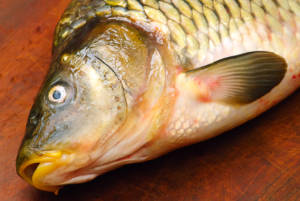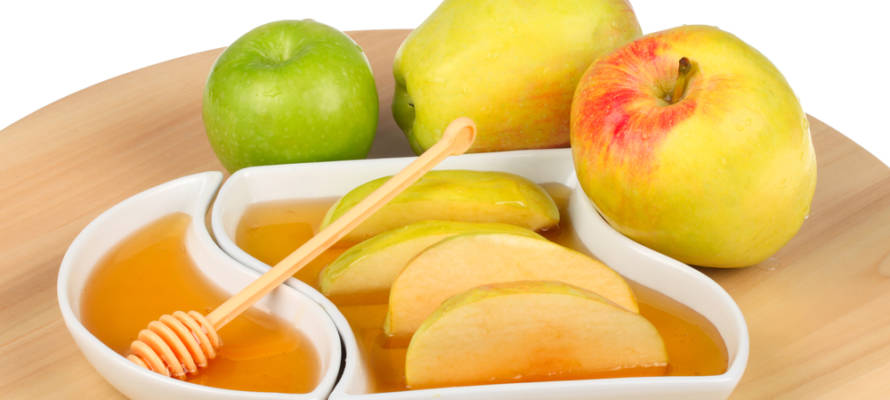What is it about symbolism, particularly the eating of symbolic foods, that has found such a prominent place on the most hallowed of days?
By Rabbi Ari Enkin
Rabbinic Director, United with Israel
Rosh Hashana is unique in that it is a holiday especially abundant in traditions and customs. Yet, upon deeper examination, one will find that from the Torah’s perspective, only one activity is actually required of us on Rosh Hashana, and that is the blowing of the shofar (ram’s horn).
Hence, it seems that the ceremonies, nuances, and emphases of the day are much more heavily drawn from the realm of symbolism rather than obligation.
Whether it’s an apple dipped in honey for a sweet year, “throwing” away our sins through the Tashlich ceremony (ritual of tossing pieces of bread into a body of water, symbolizing the casting away of our sins), or placing a fish head on the table so that we may become “like the head and not like the tail,” we express our aspirations to God with these indirect hints over the course of Rosh Hashana.
What is it about symbolism, particularly the eating of symbolic foods, that has found such a prominent place on the most hallowed of days?
The Talmud teaches that “omens are significant [and have influence]…on the entire year,” and hence, eating sweet foods holds much promise in our efforts to sweeten God’s verdict for us in the coming year.
It was specifically the apple that evolved as the primary symbolic food of Rosh Hashana because an apple orchard represents “a field blessed by God” and is also symbolic of paradise. Furthermore, the apple symbolizes the mutual love that exists between God and the Jewish people, as it is written: “Beneath the apple tree I aroused your love.” (Song of Songs)
While the emphasis on symbolic foods reigns supreme, there is a minority opinion that actually suggests that we should not be eating symbolic foods on Rosh Hashana in an effort to influence God. Indeed, some claim this practice borders on witchcraft – something clearly forbidden by the Torah.
It is suggested that in order to pacify these authorities, we should keep in mind, while eating the symbolic foods, that it is God who is in control of all that befalls us, not our diet. Besides the symbolic foods, one would be well advised to focus on the theme of the day: “Prayer, charity, and repentance ward off evil decrees.”

The head of a fish is another symbolic Rosh Hashana food. (Shutterstock)
Nevertheless, eating symbolic foods is a well-accepted and mainstream Jewish practice, even legislated in the Code of Jewish Law, which ought to be meticulously observed by all.
In fact, the idea of eating symbolic foods extends even to eating foods whose name resembles any form of good fortune in any language.
As the joke goes, perhaps we should consider eating a raisin and celery on Rosh Hashana in the hope that God blesses us with a “raise in salary.” (Get it?)
Not only do we eat traditional foods in order to arouse Divine fortune for a good year, but there are also foods we should avoid for the same reason. For example, many people prefer not to eat nuts on Rosh Hashana, as the numerical value of the Hebrew word for “nut” (egoz) is the same as that of “sin.”
For those of you who are not concerned with violating the prohibition on witchcraft as mentioned above, here are some additional Talmudically prescribed ways for you to discover how your upcoming year will turn out: If you want to know if you will live out the year, simply hang an oil lamp in your house; if all the oil burns within 10 days, that’s evidence that you’ll survive.
It’s easy to identify whether your business interests will succeed: Simply raise a chicken in your home; if it grows fat, then it’s safe to invest. Last but not least, if you want to go on a trip and are wary of security issues, simply stand in a dark house; if you are able to see the shadow of a shadow, then rest assured that you will return safely. Although these omens are indeed found in the Talmud, I respectfully recommend keeping away from them… Times have changed!

Do You Love Israel? Make a Donation - Show Your Support!
Donate to vital charities that help protect Israeli citizens and inspire millions around the world to support Israel too!
Now more than ever, Israel needs your help to fight and win the war -- including on the battlefield of public opinion.
Antisemitism, anti-Israel bias and boycotts are out of control. Israel's enemies are inciting terror and violence against innocent Israelis and Jews around the world. Help us fight back!




